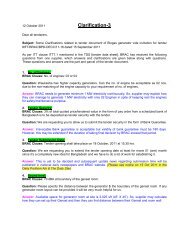Research resourcesCapacity streng<strong>the</strong>ning forglobal <strong>health</strong> researchArticle by Gunvanti Goding (pictured), Michael Chew <strong>and</strong> Jimmy WhitworthDisparities around <strong>the</strong> globe in life expectancy, childsurvival, maternal mortality <strong>and</strong> <strong>health</strong> expenditure allhighlight <strong>the</strong> gross inequity of <strong>health</strong> <strong>and</strong> welfare in<strong>the</strong> world <strong>to</strong>day. Several of <strong>the</strong> Millennium DevelopmentGoals focus on <strong>health</strong>. The goals of reducing child mortality,improving maternal <strong>health</strong>, <strong>and</strong> combating HIV <strong>and</strong> AIDS,malaria <strong>and</strong> o<strong>the</strong>r diseases all require major improvements indelivery <strong>and</strong> uptake of <strong>health</strong> services. We need both newinterventions <strong>and</strong> better application of existing proveninterventions. A concerted response is urgently required <strong>to</strong>ensure <strong>the</strong> generation of new knowledge for effective diseaseprevention, development of affordable diagnostics <strong>and</strong><strong>the</strong>rapeutics, efficient delivery of cost-effective interventions,<strong>and</strong> <strong>health</strong> promotion. Central <strong>to</strong> this response is <strong>the</strong> need forresearch <strong>and</strong> increased uptake of research outcomes.The developing world faces many challenges in relation <strong>to</strong><strong>health</strong> research: lack of funds; poor institutionalinfrastructure; a lack of appropriately trained personnel; huge<strong>health</strong> burdens of both communicable <strong>and</strong> noncommunicablediseases; <strong>and</strong> a lack of cohesive politicaladvocacy.Since its establishment in 1936, <strong>the</strong> Wellcome Trust hasplayed a significant role in promoting global <strong>health</strong>. TheWellcome Trust’s mission is <strong>to</strong> foster <strong>and</strong> promote researchwith <strong>the</strong> aim of improving human <strong>and</strong> animal <strong>health</strong>. Withannual grant support of over £500 million, a significantproportion is devoted <strong>to</strong> fund global <strong>health</strong> research. Forexample, in 2006, we spent £73 million on <strong>health</strong> researchin low- <strong>and</strong> middle-income countries.Streng<strong>the</strong>ning research capacity in biomedical science <strong>and</strong>public <strong>health</strong> constitutes a major component of <strong>the</strong> WellcomeTrust’s international funding strategy. We aim <strong>to</strong> build acritical mass of sustainable research capacity in developingcountries. In doing so, we support researchers <strong>to</strong> tackle <strong>the</strong>The Wellcome Trust’s mission is <strong>to</strong> foster <strong>and</strong>promote research with <strong>the</strong> aim of improving human<strong>and</strong> animal <strong>health</strong>. With annual grant support of over£500 million, a significant proportion is devoted <strong>to</strong>fund global <strong>health</strong> researchmost pressing local <strong>health</strong> problems <strong>and</strong> <strong>to</strong> deliver <strong>health</strong>benefits for people <strong>and</strong> <strong>the</strong>ir lives<strong>to</strong>ck.Personal supportBuilding capacity locally includes encouraging excellentresearchers <strong>to</strong> develop <strong>the</strong>ir careers in <strong>the</strong>ir home countries orregions (see Example 1). Support needs <strong>to</strong> be long-term <strong>to</strong>nurture <strong>the</strong> organic development of teams, centres <strong>and</strong>networks. A good example of this working successfully is ourrelationship with research teams in Kenya which hasflourished over <strong>the</strong> past 50 years. The Trust’s currentprogramme, led by Dr Norbert Peshu <strong>and</strong> Professor KevinMarsh, undertakes labora<strong>to</strong>ry, clinical, field <strong>and</strong> policyresearch on issues of public <strong>health</strong> importance <strong>to</strong> Kenya <strong>and</strong><strong>the</strong> region. There are strong links with <strong>the</strong> Kenyan Ministry ofHealth through <strong>the</strong> Kenya Medical Research Institute(KEMRI), which ensure that important research findingsmake <strong>the</strong>ir way in<strong>to</strong> policy <strong>and</strong> make a difference <strong>to</strong> medicalcare (see Example 2). This programme has influence acrossSub-Saharan Africa <strong>and</strong> is attracting research workers frommany parts of Africa <strong>and</strong> beyond.We provide flexible training <strong>and</strong> career progressionopportunities for <strong>the</strong> best people at all stages in <strong>the</strong>ir careers<strong>to</strong> work on diseases of importance in a developing countrysetting. We have recently established a range of fellowshipawards for applicants from Africa, Asia <strong>and</strong> South Americawishing <strong>to</strong> carry out public <strong>health</strong> <strong>and</strong> tropical medicineresearch. Awards are available from junior fellowships forMasters students <strong>to</strong> senior fellowships for outst<strong>and</strong>ingindividuals wishing <strong>to</strong> establish <strong>the</strong>mselves as researchleaders.Institutional supportCrucial <strong>to</strong> boosting research capacity is <strong>the</strong> need <strong>to</strong> ensurethat <strong>the</strong> research that we support helps <strong>to</strong> consolidate localinfrastructures <strong>and</strong> national institutions, <strong>and</strong> is geared <strong>to</strong>national priorities. To this end, <strong>the</strong> Trust has committed £10million over 5 years <strong>to</strong> a partnership with <strong>the</strong> UK Departmentfor International Development, <strong>and</strong> <strong>the</strong> InternationalDevelopment Research Centre, Canada, which aims <strong>to</strong>streng<strong>the</strong>n <strong>health</strong> research capacity in Kenya <strong>and</strong> Malawi.The partnership aims, through working with local ministriesof <strong>health</strong> <strong>and</strong> key national institutions, <strong>to</strong> streng<strong>the</strong>n <strong>the</strong>generation <strong>and</strong> use of <strong>health</strong> research at a national <strong>and</strong>Global Forum Update on Research for Health Volume 4 ✜ 137
Research resourcesinternational level. Key components of this initiative include:✜ supporting <strong>and</strong> training promising individual scientists;✜ streng<strong>the</strong>ning key academic research <strong>and</strong> policy-makinginstitutions;✜ facilitating collaborative engagement of nationalrepresentatives;✜ improving regulation <strong>and</strong> co-ordination of <strong>the</strong> nationalresearch environment.There are significant difficulties with building researchcapacity in developing countries. Funding opportunities forindividuals are often fragmented <strong>and</strong> difficult <strong>to</strong> access. Thepipeline of young school leavers <strong>and</strong> graduates needed <strong>to</strong>embark on scientific careers is thin <strong>and</strong> unreliable. There is alack of credible career pathways <strong>and</strong> few role models ofsuccessful research leaders. Research infrastructure is ofteninadequate <strong>and</strong> <strong>the</strong>re is a lack of connectivity betweenteaching in universities <strong>and</strong> <strong>the</strong> institutes in which research isconducted. Over time we aim <strong>to</strong> help support <strong>the</strong>development of a critical mass of skilled <strong>and</strong> adequatelyremunerated academic <strong>and</strong> technical staff working in avibrant academic environment with strong national <strong>and</strong>international links with research partners <strong>and</strong> networks. Thisrequires strong national political advocacy for science <strong>and</strong>research <strong>and</strong> development of national strategies for researchpriorities. This will involve not only <strong>the</strong> scientific perspectiveof what will work but also <strong>the</strong> <strong>social</strong> viewpoint of <strong>health</strong>delivery <strong>to</strong> those in most need.ChallengesLooking <strong>to</strong> <strong>the</strong> future we need <strong>to</strong> think about how we can useour funding schemes <strong>and</strong> o<strong>the</strong>r mechanisms as drivers ofchange. We need <strong>to</strong> encourage more partnerships <strong>and</strong>networks between institutions in developing countries <strong>and</strong>also <strong>to</strong> encourage more equitable partnerships betweennor<strong>the</strong>rn institutions <strong>and</strong> those in developing countries (seeExample 3). The issues of attrition <strong>and</strong> brain drain need <strong>to</strong> beaddressed. This requires not only sensitive policies indeveloped countries <strong>to</strong> avoid pulling skilled scientists awayfrom <strong>the</strong>ir home countries, but also local Government <strong>and</strong>international support for developing mechanisms for <strong>the</strong>retention of high quality trained professionals.We all need <strong>to</strong> be advocates for science <strong>and</strong> technology,<strong>and</strong> <strong>to</strong> support <strong>the</strong> skilled individuals who are essential <strong>to</strong>enhance <strong>the</strong> <strong>health</strong>, lives <strong>and</strong> livelihoods of those in <strong>the</strong>poorest countries of <strong>the</strong> world. ❏Example 1In 2002 Dr Mayfong Mayxay received a Wellcome TrustResearch Training Fellowship for a clinical <strong>and</strong> labora<strong>to</strong>ryassessment of antimalarial drug efficacy in <strong>the</strong> Lao People’sDemocratic Republic (Lao PDR or Laos). His researchinvolved spending long periods in rural Lao studying how best<strong>to</strong> treat malaria patients in one of <strong>the</strong> poorest countries in <strong>the</strong>world, living <strong>and</strong> working in villages where initially <strong>the</strong>re wereno modern utilities like piped water <strong>and</strong> grid electricity, letalone telephones, televisions <strong>and</strong> <strong>the</strong> Internet.When Mayfong obtained a scholarship under a SEAMEO-TROPMED programme he contacted Mahidol UniversityProfessors Sasithon Pukrittayakamee <strong>and</strong> Nick White, who<strong>to</strong>ok him under <strong>the</strong>ir wing. Mayfong completed a PhD,succeeded in obtaining a competitive Trust fellowship, <strong>and</strong> isnow a critical member of <strong>the</strong> Lao Project funded by <strong>the</strong> Trustas a part of its Major Overseas Programme in South-East Asia.Since 2001 Mayfong, in collaboration with his mainly Lao<strong>and</strong> British colleagues, has published nearly 30 papers ininternational peer-reviewed journals, many having real impactin directing <strong>health</strong> policies <strong>and</strong> practice in Laos. His clinicaltrials on artemisinin-based combination <strong>the</strong>rapies (ACT)provided key evidence for <strong>the</strong> Lao Government <strong>to</strong> change itsnational malaria treatment policy <strong>to</strong> ACT. He has also beeninvestigating <strong>the</strong> causes of fever in rural Laos <strong>and</strong> made keyExample 2Dr Michael English is a Wellcome Trust Clinical Senior Fellowbased at <strong>the</strong> Kenya Medical Research Institute/Wellcome Trustprogramme in Nairobi, Kenya. His previous research fundedthrough <strong>the</strong> Trust’s Research Career Development Fellowship,also based in Kenya, has demonstrated that <strong>health</strong> workerscontributions <strong>to</strong> <strong>the</strong> first post-colonial medical journal in Laoswhich describes <strong>the</strong> Project’s infectious disease research inEnglish <strong>and</strong> Lao languages.In July 2007, Mayfong published a paper, in collaborationwith his colleagues in <strong>the</strong> Lao Project, <strong>the</strong> Lao Government<strong>and</strong> <strong>the</strong> USA, in <strong>the</strong> prestigious American Journal of TropicalMedicine <strong>and</strong> Hygiene, reporting a sophisticated study onpopulation genetic markers in malaria parasites. This papersuggested that <strong>the</strong> previous national antimalarial treatmentpolicy of chloroquine would not be efficacious in any parts ofLaos <strong>and</strong> that ACT would be superior over <strong>the</strong> whole country<strong>and</strong> not just where clinical trials had been conducted. Itexemplifies <strong>the</strong> nature of <strong>the</strong> research emanating from <strong>the</strong>Trust’s Major Overseas Programme in South-East Asia whichincludes work in Laos. Under <strong>the</strong> overall direction of ProfessorNick White, University of Oxford, <strong>the</strong> South-East AsiaProgramme, which includes developing <strong>the</strong> research site inLaos, has its major base at Mahidol University, Bangkok,Thail<strong>and</strong>. Professor White’s interest in <strong>the</strong> pharmacology ofantimalarial drugs <strong>and</strong> <strong>the</strong> studies on artemisinin derivativeshas provided <strong>the</strong> basis for treatment trials for malaria on alarge scale in Thail<strong>and</strong> <strong>and</strong> Viet Nam, <strong>and</strong> subsequentrecommendation by WHO as <strong>the</strong> treatment of choice formalaria in many countries.are unaware of <strong>the</strong> evidence defining appropriate hospitaltreatment of children with severe diseases includingmalaria, anaemia, pneumonia, diarrhoea/dehydration, severe malnutrition <strong>and</strong> simple neonataldisorders. Treatment is <strong>the</strong>refore commonly inappropriate,inadequate or occasionally, even actually dangerous. Such138 ✜ Global Forum Update on Research for Health Volume 4



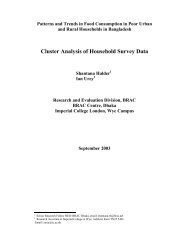
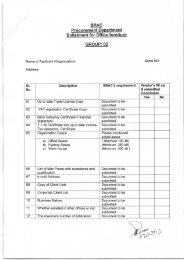
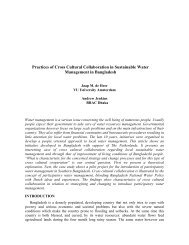
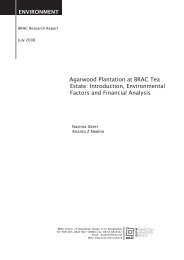
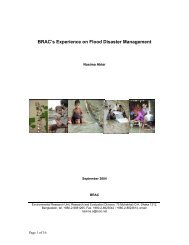
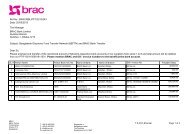
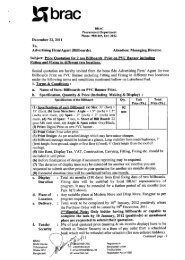
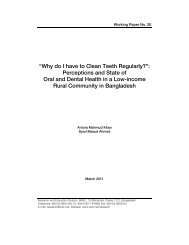
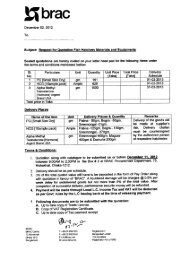

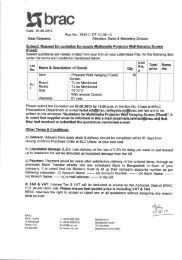
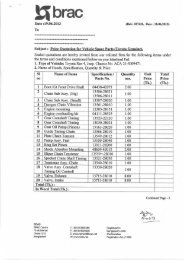
![[re-tender] RFQ for supply of Diesel Generator - Brac](https://img.yumpu.com/44421374/1/186x260/re-tender-rfq-for-supply-of-diesel-generator-brac.jpg?quality=85)
